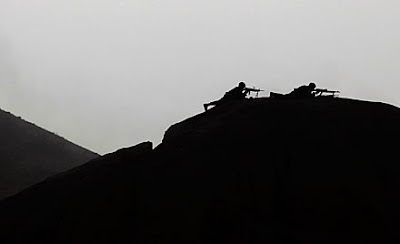I was not surprised to learn that Facebook had passed this milestone. The site works so well on so many levels -- FB can inform and invite discussion (which is what I hope the WMRA page does), it keeps our mobile population connected, and it can be simply silly and fun.
Anyone else remember the hula hoop craze of 1958 when 20 million Whamo hoops sold in six months? It pales in comparison, doesn't it? And the Beatles had only sold a paltry 100 million albums by February of 1965.
There may be all kinds of concern about FB and privacy, but there's absolutely no argument that FB is a huge part of our internet life in this, the Internet Age.
What I used the WMRA Facebook page for this morning, however, was to post about something that is anything but fun; WikiLeaks' posting of what the New York Times calls "The War Logs:" 6 years (2004-2009) of leaked classified documents that fill us in on what's going on in Afghanistan.
 |
| Kevin Frayer/Associated Press |
For example, the Wall Street Journal writes this morning,
There appears to be evidence of war crimes in the leaked documents, WikiLeaks founder Julian Assange said in a news conference in London on Monday according to the Associated Press. "It is up to a court to decide really if something in the end is a crime. That said ... there does appear to be...."And then there's disturbing information about Pakistan as reported in the New York Times:
. . . [Leaked documents] suggest that Pakistan, an ostensible ally of the United States, allows representatives of its spy service to meet directly with the Taliban in secret strategy sessions to organize networks of militant groups that fight against American soldiers in Afghanistan, and even hatch plots to assassinate Afghan leaders.It strikes me that it's one thing to rant about suspected dark deeds in this ugly war; it's another to have them detailed on our computer screens by, it appears, those who have first-hand knowledge of them. We now have to stop ranting and start thinking, assessing, and, most importantly, reading. It is, in some ways, yet another end of innocence. "National security" in a sense protected us from having to deal with all this difficult information.
There's a lot more on this story out there on the internet this morning, and it's not just about the documents, themselves. There's White House National Security Adviser James Jones' strong statement about "national security," condemning WikiLeaks' release of the documents as "irresponsible." Yet, the "Greenslade Blog" of the British newspaper, The Guardian asks:
Do we believe factual reports by US soldiers about the killing of civilians is worthless? Do we really think that hard information about the increasing strength of the Taliban should be covered up? Is it of no consequence that there is new and more obvious evidence about Pakistani and Iranian aid for the Taliban?Do we believe? Do we really think? Is it?
Well, please, please, please don't answer that. Yet.
Last week's news kerfuffle was caused by the misuse of a Shirley Sherrod speech by He Who Shall Not Be Named (yes, that conservative blogger, who's been named enough, already) and the administration's subsequent overreaction to it. It was fueled on the internet, in large part I would suspect by us 500 million FB users reacting too quickly to what we read on the internet.
I hope we learned from this disaster that we need to take time to be informed before we form our opinions. And to shy away from the opinions of those who do not appear to be reliably sourcing their material.
So, may we all have more than our customary patience while we wait in line at WikiLeaks. Might I suggest amusing yourself on Facebook, chatting with friends about how long they've been waiting . . .
Note: I just went back to insert a link to WMRA's Facebook page and realized I had done what I just blogged against doing: I had solicited an immediate response from you to the WikiLeaks story. So, I've dope-slapped myself, and I do promise to try to do better.












i think security through design, rather than security through obscurity, is a more sensible approach.
ReplyDeletehttp://en.wikipedia.org/wiki/Security_through_obscurity